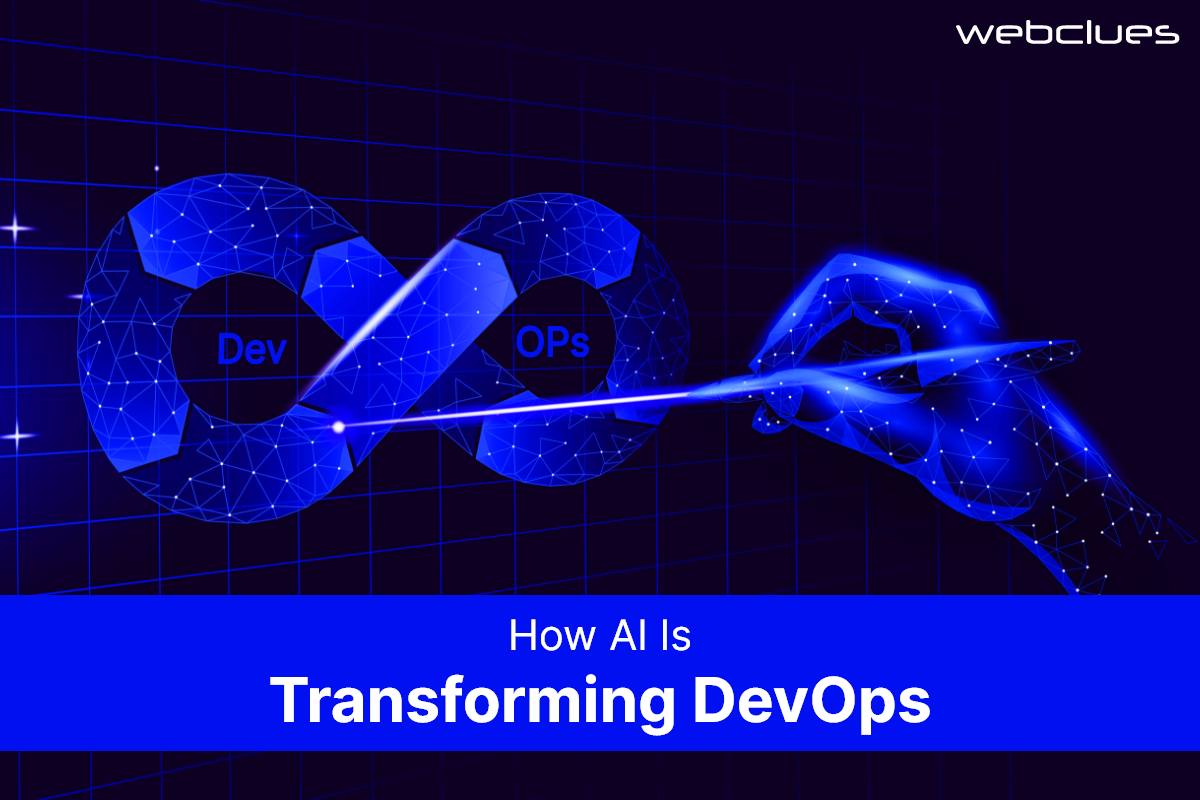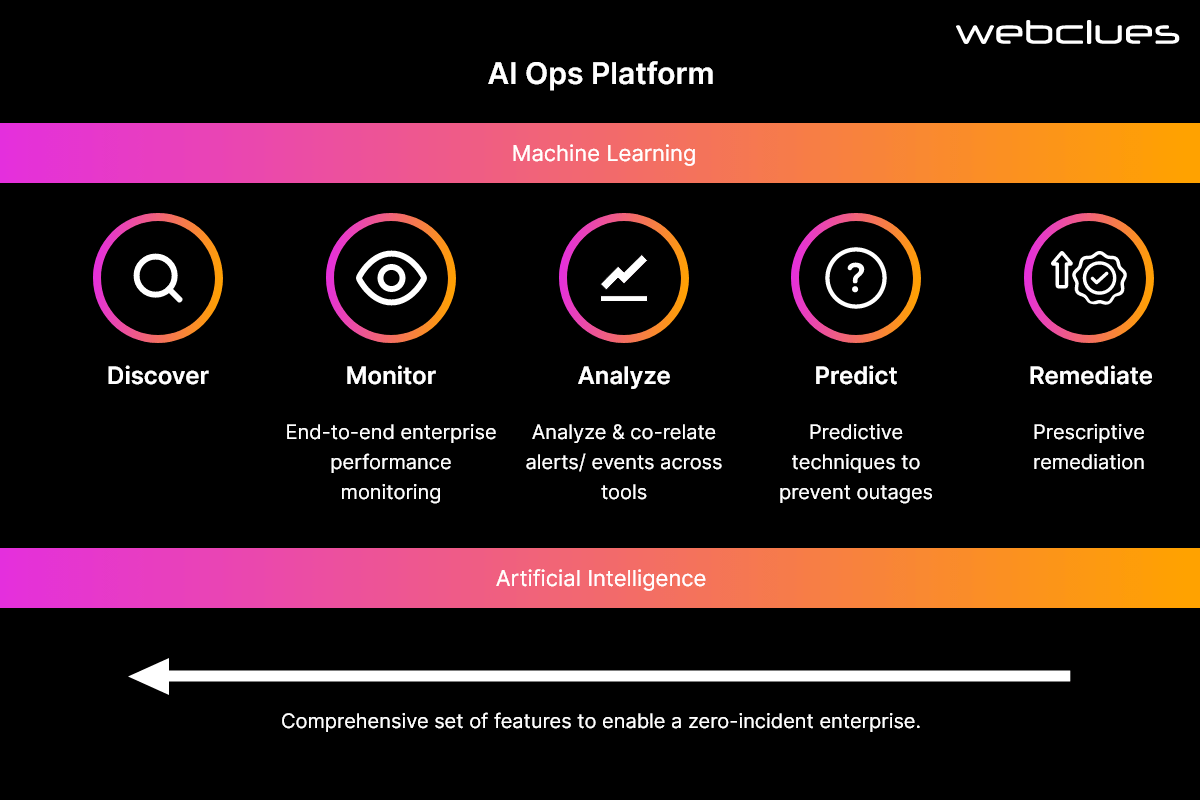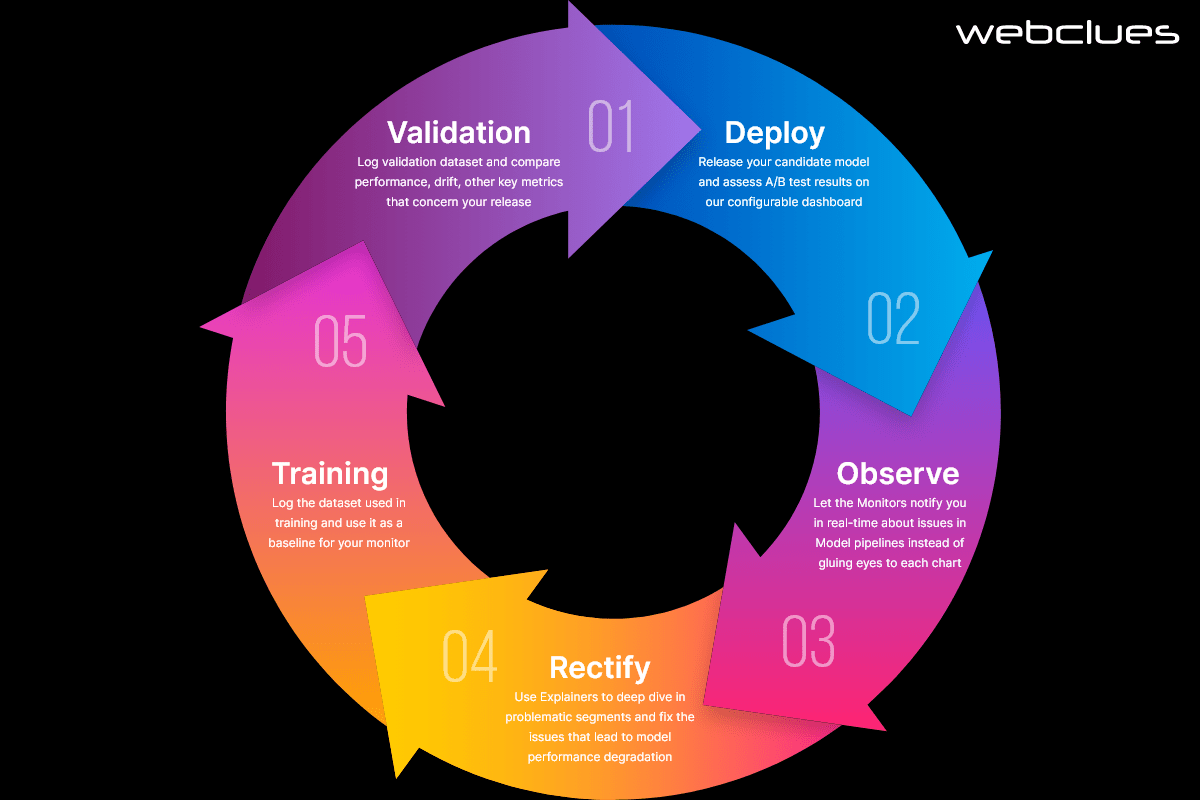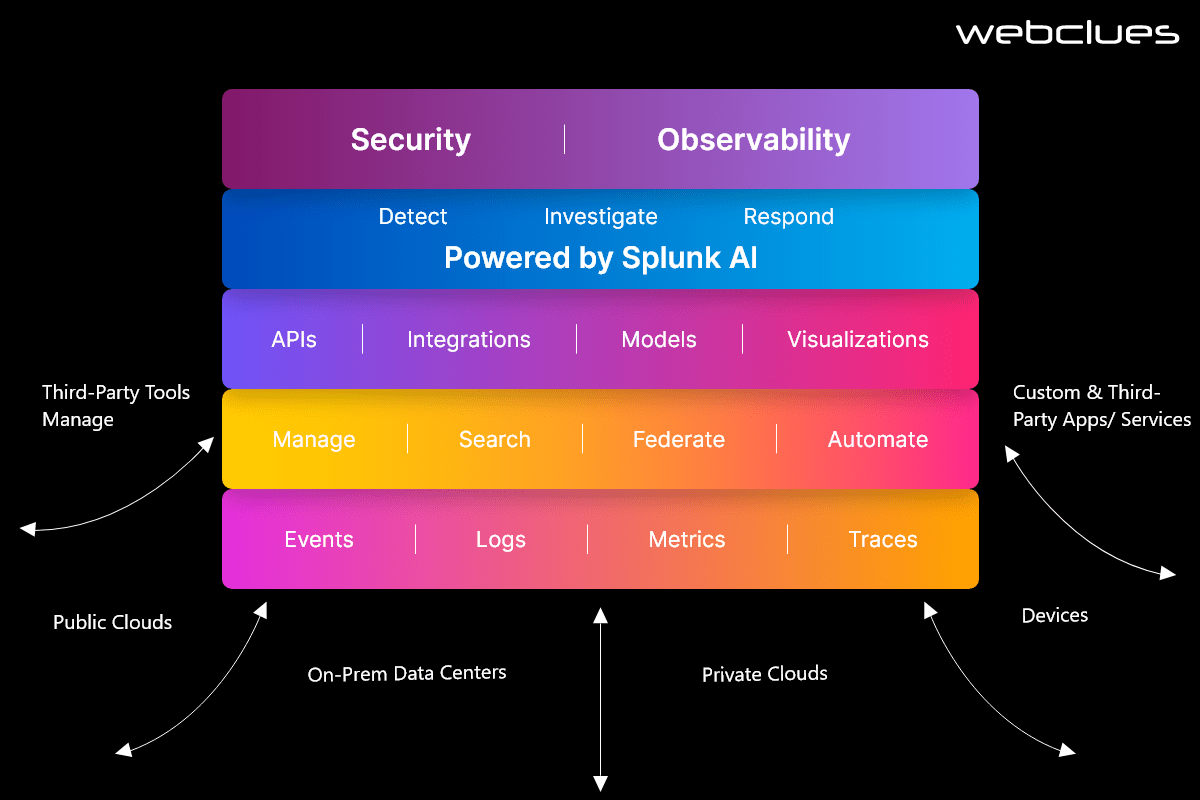How AI Addresses DevOps Monitoring and Observability Challenges

Anyone who is associated with DevOps services in one way or the other will be aware of the fact that the critical principle of continuous monitoring comprises keeping a watchful eye on observable systems and application performance in real-time. This is instrumental for DevOps teams to detect and react to problems quickly, often before they impact users. Continuous monitoring is the linchpin of maintaining application health and informing future improvement efforts. But what if we told you that you could enhance this process and make it more straightforward using Artificial Intelligence (AI)?
AI is changing the game in the way we analyze and process data. With observability becoming increasingly crucial for modern IT operations with the advent of cloud-native architectures and microservices, AI-driven insights are proving to be particularly vital.

In this article, we’ll explore how AI development services can optimize continuous monitoring and observability by analyzing logs and metrics to predict potential system failures or performance degradation. This proactive approach can save time, reduce downtime, and ensure your applications run like a well-oiled machine.
How Observability can benefit from AI-powered insights
AI-based insights can influence the world of DevOps in a myriad of ways. For instance, it can help automate several processes, optimize workflows, and reduce Mean Time to Repair (MTTR). It can even facilitate smart alerts, helping IT teams detect and diagnose issues in real-time, along with their potential solutions. This allows them to respond with more agility and avoid further disruptions.
AI systems are driven by machine learning algorithms and predictive analytics, enabling them to process and analyze huge amounts of data and identify potential disruptions before they occur. Moreover, they can even assist teams in identifying the root cause of the problem and prevent it from reoccurring in the future.

Let’s dig deeper into how AI can revolutionize continuous monitoring and observability.
Noteworthy Use Cases of AI in Continuous Monitoring and Observability
- Anomaly Detection During CI
Imagine you're in the midst of the continuous integration phase of your DevOps pipeline. AI can step in and analyze historical data to detect anomalies that might otherwise go unnoticed. It can help teams flag any irregular activities that they can review before moving on to the next phase. Tools like IBM Watson Anomaly Detection are pioneers in using AI to detect patterns and irregularities, adding an extra layer of confidence to your CI processes.
- Improving Code Quality Assurance
Maintaining high code quality is the bedrock of building robust software systems. With AI, you can improve your code quality assurance during the development phase, leading to fewer bugs and vulnerabilities in your applications. Innovative tools like DeepCode and Codota tap into the immense potential of AI by meticulously examining your codebase. They draw upon extensive databases of code samples and solutions to identify potential issues and offer tailored suggestions for improvement. This AI-driven approach ensures that your codebase evolves into a more resilient and dependable foundation for your software projects.
- Optimizing Test Case Selection
Efficiently choosing the right test cases during the continuous integration (CI) phase is crucial for delivering reliable software. AI plays a pivotal role by harnessing historical test data to intelligently select test cases with the highest likelihood of detecting new defects. Tools such as Testim.io utilize AI to prioritize testing based on risk analysis and assess the potential impact of recent changes. This strategic approach ensures that your CI pipeline remains agile and effective, detecting issues early in the development process.
- Predictive Analysis in Continuous Delivery (CD)
AI can reinvent the way we operate continuous delivery (CD), which is the process of deploying code to production. By tapping into historical deployment data, AI foresees potential issues before they escalate into disruptive ones, considerably minimizing downtime.
Leading the charge in this AI-driven revolution are advanced tools like Splunk, which are equipped with AI and machine learning capabilities. These tools scrutinize your operational data to anticipate and mitigate potential hiccups. As a result, your CD pipeline flows smoothly, ensuring that your code reaches production with the utmost reliability and efficiency.

- Automated Rollback Mechanisms
AI has the capability of identifying any issues that may arise during the deployment process. AI can be equipped to automatically trigger rollbacks if a particular deployment begins to show signs of trouble. This intelligent capability is brought to life by Harness, which utilizes machine learning to gain a deep understanding of your application’s typical behavior.
Leveraging this insight, AI acts promptly, rolling back the deployment to the last known stable state as soon as it detects anomalies or irregularities. This automated response ensures that problems as addressed on time, sparing you the need for manual intervention. With AI vigilantly monitoring the CD process, your deployment processes remain resilient and agile, guaranteeing the consistent delivery of reliable software.
- Efficient Infrastructure Resource Management
Mastering the art of cloud resource management is an ongoing challenge, however, AI-powered tools like CAST.AI and Turbonomic are emerging as invaluable assets. They work consistently to fine-tune and optimize your cloud infrastructure, with the aim of achieving two critical objectives: enhancing performance and minimizing costs.
These AI tools provide real-time insights that help you optimize the management of your cloud infrastructure. They allow you to strike a delicate balance, where your infrastructure operates at its peak performance while staying well within your budget constraints. With AI's dynamic assistance, you can be confident that your cloud resources are optimized for efficiency so that your applications run smoothly without breaking the bank.
- Streamlining Incident Management
Incident management can be a chaotic process, however, AI has the potential to bring some order to it. From the moment an incident is detected to its swift resolution, tools like BigPanda and Moogsoft AIOps tap into AI’s incredible potential to orchestrate an optimum response.
AI can aggregate, correlate, and meticulously analyze alerts from diverse resources and thus transform the often unorganized incident environment into a coherent, actionable narrative. This intelligent approach not only reduces the overwhelming noise but also expedites the resolution process. The result? Minimal disruption to your operations, ensuring that your business continues to run smoothly even in the face of adversity.
- AI-Powered Log Analysis
While logs comprise vast amounts of valuable data, the manual process of sifting through them can be an overwhelming and time-consuming task. This is where AI-driven tools like Logz.io can play a pivotal role. These tools employ AI's analytical prowess to scrutinize logs meticulously, discovering intricate patterns that would be challenging for human operators to identify.
This AI-driven approach goes beyond conventional log analysis, offering a deeper understanding of your data. It not only helps in identifying anomalies but also streamlines the troubleshooting process. With AI at the helm, you can efficiently navigate the complexities of log data, discover hidden insights, and resolve issues with speed and precision.
- Advanced Security Threat Detection
The importance of security cannot be overstated, and AI can certainly boost your defenses. For instance, cutting-edge tools like Darktrace utilize machine learning to detect and respond to unusual behaviors in real time, effectively identifying potential security threats before they have the chance to inflict damage.
AI's unique strength lies in its capability to analyze intricate patterns and pinpoint anomalies that might elude human oversight. This transformative ability can play a crucial role in safeguarding your systems. AI can help you strengthen your security posture and ensure that your digital assets remain resilient against evolving threats, ensuring peace of mind.
- Proactive Network Issue Prediction
AI's influence isn't confined to just software, as it extends to network monitoring as well. Advanced tools like Kentik are at the forefront of network management with the ability to scrutinize traffic patterns efficiently and thereby predict network outages before they rear their disruptive heads.
Utilizing AI for network issue prediction, it becomes possible to provide a seamless and uninterrupted user experience. It helps address network issues proactively, often before they have the chance to affect end-users. This way, AI benefits both DevOps teams and the end-users, who expect seamless digital interactions, taking operational excellence to the next level.
Dealing with Challenges in Continuous Monitoring with AI
Let’s explore some hurdles organizations might encounter when integrating AI into their continuous monitoring and observability processes, along with potential solutions.
Data Quality and Availability
Ensuring the success of AI-powered continuous monitoring starts with robust data quality and accessibility. The effectiveness of AI tools relies heavily on the quality and quantity of data they're provided with. Inadequate or poor-quality data can lead to inaccurate insights and predictions. To overcome this challenge, it's essential to implement effective data governance and management practices. This involves thorough data cleaning and proper labeling to facilitate the training of AI models.
Bridging the Skills Gap
Integrating AI-engineered tools often requires new skills that your existing IT team might lack. There could be a gap in understanding how to effectively utilize these tools. To address this challenge, comprehensive training should be provided to your DevOps team, helping them bridge the skills gap. Additionally, consider the option of hiring AI specialists or collaborating with experienced vendors to facilitate the seamless implementation and management of AI tools.
Overcoming Resistance to Change
Resistance to change can be a significant barrier to adopting AI in continuous monitoring. Employees may express concerns about job security or perceive difficulties in adapting to new tools. To overcome this challenge, clear and transparent communication is essential. It's crucial to articulate the benefits of the AI transition at both organizational and individual levels. DevOps engineers should be reassured that AI is meant to assist them, not replace them. Organizing workshops and training sessions can also help ease the transition.
Seamless Integration with Existing Systems
AI tools must seamlessly integrate with your existing DevOps tools and workflows to add value without disrupting operations. To address this challenge, it's important to select AI tools that are compatible with your current infrastructure. Alternatively, consider implementing integration middleware if necessary. Conducting a proof-of-concept (PoC) can ensure that the new AI tools integrate smoothly into your existing ecosystem.
Cost Considerations
Deploying AI tools can require a substantial upfront investment that covers both the tools themselves and necessary infrastructure upgrades. To overcome this challenge, conducting a thorough cost-benefit analysis is crucial. This analysis helps you understand the return on investment (ROI) that AI tools can deliver. Starting with lower-cost or open-source tools, or opting for cloud-based AI services, can mitigate the initial investment required for infrastructure upgrades.
Conclusion
It is apparent that incorporating artificial intelligence has taken the fundamental practice of real-time system performance monitoring. AI has opened the doors to a multitude of opportunities that can indeed change the game in terms of continuous monitoring and observability.
This suggests that the benefits of AI integration in DevOps are undeniable. It enables teams to operate more efficiently, with heightened agility and intelligence at their disposal. It enhances the reliability and resilience of your applications and infrastructure while nurturing a culture of ongoing improvement.
So now the question is: are you ready to embrace the future of AI-driven DevOps? The possibilities are vast and the time cannot be better. At Webclues, our expertise in cloud-based AI services will enable you to not only streamline your DevOps work but also be ahead of the curve in terms of innovation in the ever-evolving IT landscape. Feel free to reach out to us to hire AI developers and level up your DevOps monitoring and observability processes with AI integration.
Build Your Agile Team
Hire Skilled Developer From Us
Looking to leverage AI to elevate your DevOps processes?
At WebClues, we can help you harness the potential of AI to enhance continuous monitoring & observability, along with addressing other crucial DevOps challenges.
Book a Call NowOur Recent Blogs
Sharing knowledge helps us grow, stay motivated and stay on-track with frontier technological and design concepts. Developers and business innovators, customers and employees - our events are all about you.
Contact Information
Let’s Transform Your Idea into Reality - Get in Touch
India
Ahmedabad
1007-1010, Signature-1,
S.G.Highway, Makarba,
Ahmedabad, Gujarat - 380051
Rajkot
1308 - The Spire, 150 Feet Ring Rd,
Manharpura 1, Madhapar, Rajkot, Gujarat - 360007
UAE
Dubai
Dubai Silicon Oasis, DDP,
Building A1, Dubai, UAE
USA
Delaware
8 The Green, Dover DE, 19901, USA
New Jersey
513 Baldwin Ave, Jersey City,
NJ 07306, USA
California
4701 Patrick Henry Dr. Building
26 Santa Clara, California 95054
Australia
Queensland
120 Highgate Street, Coopers Plains, Brisbane, Queensland 4108
UK
London
85 Great Portland Street, First
Floor, London, W1W 7LT
Canada
Burlington
5096 South Service Rd,
ON Burlington, L7l 4X4





